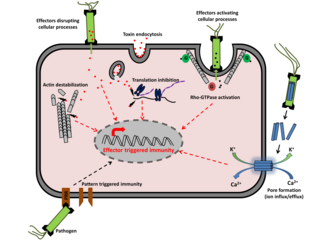Jonathan Dallas George Jones is a senior scientist at the Sainsbury Laboratory and a professor at the University of East Anglia using molecular and genetic approaches to study disease resistance in plants.

Nicotiana benthamiana, colloquially known as benth or benthi, is a species of Nicotiana indigenous to Australia. It is a close relative of tobacco.

Sir David Charles Baulcombe is a British plant scientist and geneticist. As of 2017 he is a Royal Society Research Professor. From 2007 to 2020 he was Regius Professor of Botany in the Department of Plant Sciences at the University of Cambridge.

The Sainsbury Laboratory (TSL) is a research institute located at the Norwich Research Park in Norwich, Norfolk, England, that carries out fundamental biological research and technology development on aspects of plant disease, plant disease resistance and microbial symbiosis in plants.

Melampsora lini is a species of fungus and plant pathogen found in Ireland and commonly known as flax rust.

This Daiwa Adrian Prize is an award given by The Daiwa Anglo-Japanese Foundation, a UK charity, to scientists who have made significant achievements in science through Anglo-Japanese collaborative research. Prizes are awarded every third year and applications are handled by the foundation with an assessment conducted by a panel of Fellows of The Royal Society.

Md. Tofazzal Islam is a biotechnologist, ecological chemist, educator, and author from Bangladesh. He is now a Professor and founding Director of the Institute of Biotechnology and Genetic Engineering (IBGE) of Bangabandhu Sheikh Mujibur Rahman Agricultural University (BSMRAU) in Bangladesh. He joined Bangladesh Open University (BOU) as a Lecturer in 1994 and became an Assistant, Associate and full Professor in 1997, 2004 and 2010, respectively. He joined BSMRAU on July 1, 2010, as a Professor and Head of the Department of Biotechnology.

Niklaus J. Grünwald is a biologist and plant pathologist born and raised in Caracas, Venezuela of German and Swiss ancestry. He is currently a research scientist with the USDA Agricultural Research Service, a Professor (Courtesy) in the Department of Botany and Plant Pathology at Oregon State University, and a Professor (Adjunct) in the Department of Plant Pathology and Plant-Microbe Biology at Cornell University.

Effector-triggered immunity (ETI) is one of the pathways, along with the pattern-triggered immunity (PTI) pathway, by which the innate immune system recognises pathogenic organisms and elicits a protective immune response. ETI is elicited when an effector protein secreted by a pathogen into the host cell is successfully recognised by the host. Alternatively, effector-triggered susceptibility (ETS) can occur if an effector protein can block the immune response triggered by pattern recognition receptors (PRR) and evade immunity, allowing the pathogen to propagate in the host.
Jane Glazebrook is an American botanist known for her work on understanding plant defenses against pathogens and increasing crop yields. She received her Ph.D. from the Massachusetts Institute of Technology in 1991 and is now a professor of Plant Biology at the University of Minnesota. She was the editor-in-chief of the journal Molecular Plant-Microbe Interactions. She is married to Fumiaki Katagiri, who also works at the University of Minnesota as a professor of Plant Biology.

Noel Thomas Keen was an American plant physiologist. He spent his career teaching at University of California, Riverside (UCR). His research focused on the varied ability of cultivars to detect and resist pathogens.
The Irene Manton Prize of the Linnean Society of London is awarded annually for the "best thesis in botany examined for a doctorate of philosophy during a single academic year" in the United Kingdom.
Jane Elizabeth Parker is a British scientist who researches the immune responses of plants at the Max Planck Institute for Plant Breeding Research.
B. Brett Finlay, is a Canadian microbiologist well known for his contributions to understanding how microbes cause disease in people and developing new tools for fighting infections, as well as the role the microbiota plays in human health and disease. Science.ca describes him as one of the world's foremost experts on the molecular understanding of the ways bacteria infect their hosts. He also led the SARS Accelerated Vaccine Initiative (SAVI) and developed vaccines to SARS and a bovine vaccine to E. coli O157:H7. His current research interests focus on pathogenic E. coli and Salmonella pathogenicity, and the role of the microbiota in infections, asthma, and malnutrition. He is currently the UBC Peter Wall Distinguished Professor and a Professor in the Michael Smith Laboratories, Microbiology and Immunology, and Biochemistry and Molecular Biology, and Co-director and Senior Fellow for the CIFAR Humans and Microbes program. He is also co-author of the book Let Them Eat Dirt: Saving Your Child from an Oversanitized World and The Whole-Body Microbiome: How to Harness Microbes - Inside and Out - For Lifelong Health. Finlay is the author of over 500 publications in peer-reviewed journals and served as editor of several professional publications for many years.
Harold Corby Kistler is an American Adjunct Professor of biology and plant pathology at the University of Minnesota and a fellow of the American Phytopathological Society and the American Association for the Advancement of Science.
Brian John Staskawicz ForMemRS is professor of plant and microbial miology at the University of California, Berkeley and scientific director of agricultural genomics at the Innovative Genomics Institute (IGI).
Saskia A. Hogenhout, is a Dutch professor of entomology and ecology specialising in molecular plant, microbe and insect interactions.
Jan Elnor Leach is an American plant pathologist. She is known for her research of the molecular biology of plant pathogens, particularly those affecting rice plants. She was the co-editor of the Annual Review of Phytopathology from 2015-2022 and is a fellow of the American Association for the Advancement of Science and a member of the National Academy of Sciences.

Amy Olymbia Charkowski is an American plant pathologist and Professor of Plant Pathology at Colorado State University. She was elected Fellow of the American Association for the Advancement of Science in 2020.
Diane Gail Owen Saunders is a British biologist and group leader at the John Innes Centre and an Honorary Professor in the School of Biological Sciences at the University of East Anglia. Her research investigates plant pathogens that pose a threat to agriculture. She was awarded the Rosalind Franklin Award by the Royal Society in 2022.











